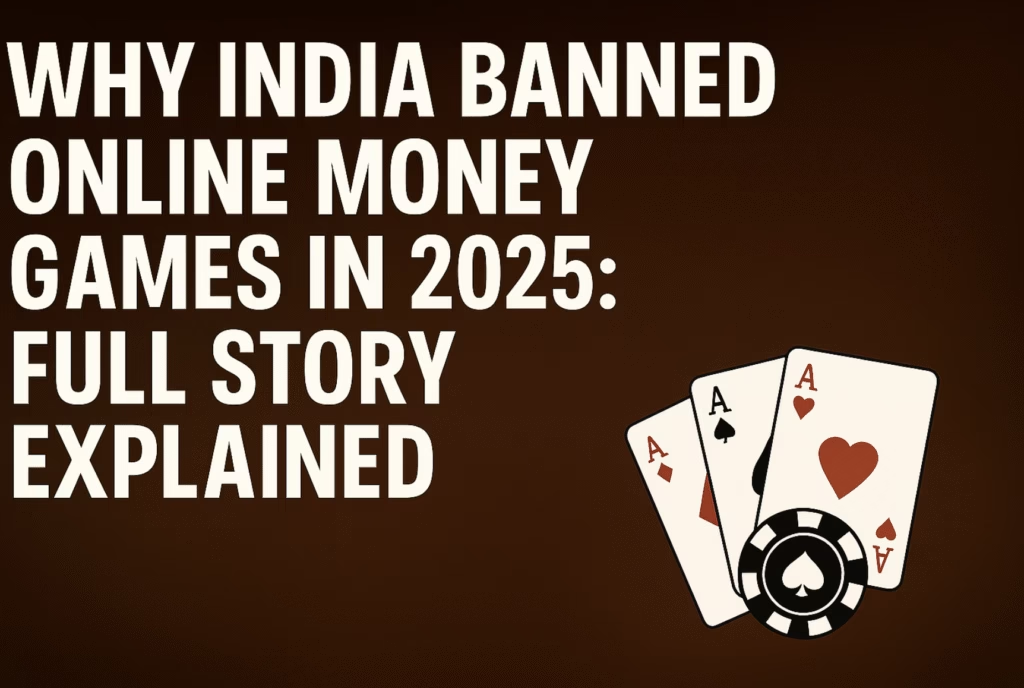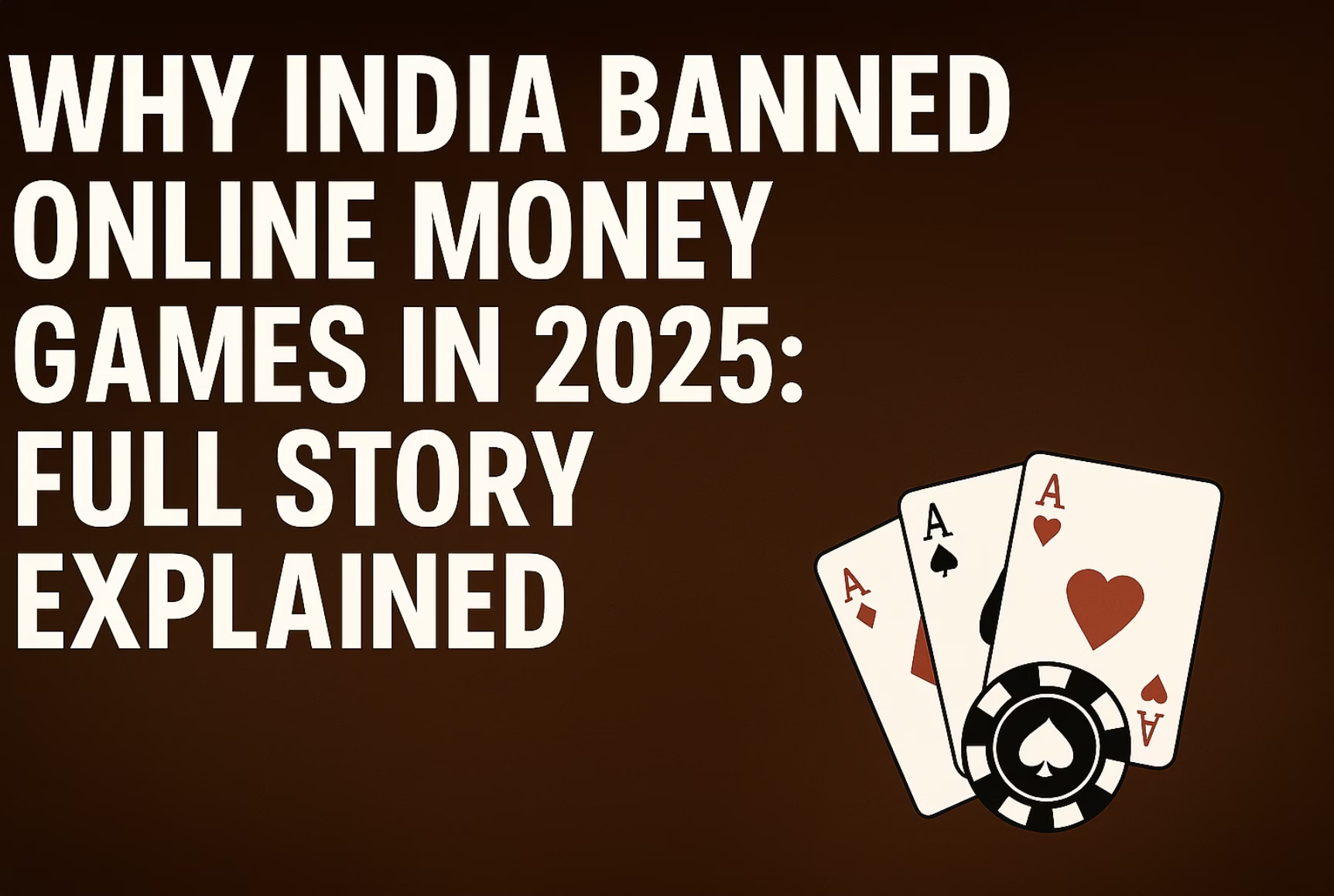On August 20th, 2025, IT Minister Ashwini Vaishnaw introduced the Promotion and Regulation of Online Gaming Bill in the Lok Sabha…………

Indian government has taken a big bold decision that’s shaking up the entire gaming industry. On August 21, 2025, the Indian government passed the Promotion and Regulation of Online Gaming Bill, which bans all games involving money, like poker, fantasy sports, lotteries, and every form of game involving money. These are no longer allowed in the country.
To ensure strict enforcement, the bill imposes hefty penalties on companies, players, promoters, advertisers, and payment gateways as well.
The government justifies this bill by pointing out that Indians loses ₹20,000 crore every year in these types of games. At the same time, the government insists that this bill is not against the whole gaming sector. This bill also promotes esports games and non monetary skill based games, with plans to establish the National Online Gaming Commission (NOGC).
In short, India is shutting doors on online money-involved gaming but also promoting esports and digital play.
India’s online gaming ban – how we got here
India applying a gaming ban did not suddenly emerge—it is the result of a long regulatory journey. go back to the Public Gaming Act of 1867, which distinguished between what is skill and what is gambling. Courts later enforced this by calling rummy and horse racing is skill-based games. On that basis, poker and fantasy gaming also became legalized.
But concerns grew—Tamil Nadu and Andhra Pradesh tried banning money games in 2017, but in court those bans were struck down. Then came the turning point: 28% GST was applied on deposits in October 2023, putting gaming in the “sin tax” bracket along with alcohol and tobacco. Tax revenues soared, but the move signaled that the government saw gaming as socially harmful.
Finally, in August 2025, Parliament passed the Promotion and Regulation of Online Gaming Bill, banning all real money games.
Why India banned online money gaming?
The Indian government says this is not an economic decision—it is a decision about social welfare, security, and public interest.
Social welfare concerns
Officials argue that online gaming addiction is continually on an upward cycle. IT Minister Ashwini Vaishnaw pointed out that Karnataka alone recorded 32 online gaming-related suicide cases in 2.5 years. With over 140 million users on these apps—and during the IPL season this number triples—the government believes these apps create financial strain, even on the banking system, which struggles with the flood of transactions during peak seasons. Despite an estimated ₹20,000 crore tax loss, the government says this decision was taken to serve the larger public interest.
National security risk
Authorities also argue that real money gaming apps are vulnerable to fraud and money laundering, especially given their offshore structure. For instance, platforms like Promto have already been raided under fraud allegations. Regulating such complex networks is extremely difficult.
No industry consultation
Interestingly, the ban was introduced without discussion with industry players. The Minister directly said it made no sense to “open a prohibition law for consultation,” since the government had already engaged with the sector for years and there was “political unanimity on the problem.”
How the gaming industry feels about this ban
When the government introduced the bill, industry reaction was negative, especially for real money gaming companies. Here’s what different players are saying:
Gaming companies and associations
Groups like the All India Gaming Federation and E-Gaming Federation are very worried by this decision. They said the ban would shut down 400+ companies, cost 2 lakh jobs, and cause the government to lose ₹20,000 crore in taxes every year. Their biggest fear is that players will move to illegal foreign apps that are unsafe and unregulated.
Business leaders
Anupam Mittal (founder of Shaadi.com and investor on Shark Tank) slammed the bill, calling it “moral policing disguised as policy.” He warned that people will create other ways to play such games, just like gutka or illegal betting.
Big companies like Nazara Technologies also fear losing their ₹800 crore investment in PokerBazzi, which may now go to waste.
Impacts on sports and ads
Dream11, MPL, and other fantasy companies may have to shut down. This will hit cricket and other sports hard because 30–40% of sponsorship comes from these gaming firms. Advertising companies and broadcasters will also lose a major source of revenue.
Esports players
Esports games are not banned—the government is encouraging esports in India. Most companies welcome this bill, but they also warn that if rules aren’t clear, esports may get stuck in red tape.
Conclusion
India’s online gaming ban is one of the boldest regulatory steps taken by the government in recent years. For the government, this is about protecting citizens, reducing addiction, and preventing fraud, even if it means losing ₹20,000 crore in tax revenues. For the industry, however, it represents a massive setback that threatens jobs, investment, and the future of fantasy sports and related businesses.
